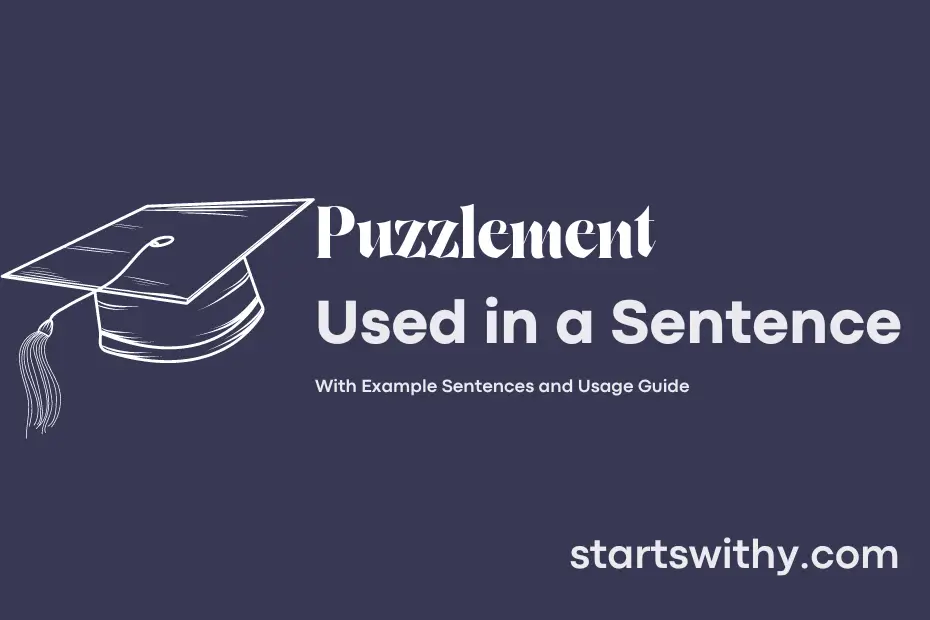Have you ever encountered a situation that left you feeling confused or bewildered? This state of uncertainty and perplexity is commonly known as puzzlement. It occurs when we encounter something unexpected or unclear, sparking a sense of curiosity and the need to find answers.
Puzzlement can arise from various experiences, such as solving a tricky riddle, deciphering a complex problem, or trying to understand someone’s cryptic behavior. It challenges our minds, prompting us to explore different perspectives and think critically. Stay tuned to learn how to navigate through puzzlement and uncover solutions effectively.
7 Examples Of Puzzlement Used In a Sentence For Kids
- Puzzlement crossed his face when he couldn’t find his favorite toy.
- She looked at the picture book with puzzlement as she tried to figure out the story.
- The teacher’s explanation left the students in puzzlement about the math problem.
- He stared at the jigsaw puzzle in puzzlement trying to fit the pieces together.
- The puppy tilted its head in puzzlement as it watched a bird fly by.
- The little girl’s eyes widened in puzzlement when she saw a rainbow for the first time.
- Puzzlement showed on his face as he tried to understand the magic trick.
14 Sentences with Puzzlement Examples
- As the professor delved into advanced quantum mechanics, the students exchanged looks of puzzlement.
- The complex differential equations on the blackboard caused a wave of puzzlement among the engineering students.
- During the debate competition, the judges observed with puzzlement as the teams presented contradictory arguments.
- The sudden cancellation of the final exam left the students in a state of puzzlement and uncertainty.
- In the computer science lab, the error message on the screen was met with puzzlement by the students.
- The conflicting historical accounts presented in class led to a sense of puzzlement among the history majors.
- As the finance professor discussed intricate stock market trends, the students listened with a mixture of interest and puzzlement.
- The enigmatic symbolism in the literature assignment left the English majors in a state of puzzlement.
- The sudden change in exam format prompted a chorus of puzzlement from the students in the lecture hall.
- The convoluted logic puzzle posed by the mathematics professor sparked an atmosphere of intense puzzlement in the classroom.
- The contradictory instructions for the chemistry experiment caused widespread puzzlement among the students in the lab.
- The unexpected twist in the physics experiment results elicited expressions of puzzlement from the students conducting the research.
- The bizarre behavior of the lab equipment left the students in a state of utter puzzlement.
- The cryptic message on the notice board was met with a collective sense of puzzlement among the student body.
How To Use Puzzlement in Sentences?
To use the word “Puzzlement” effectively in a sentence, it is important to understand its meaning and context. Puzzlement refers to a state of being confused or perplexed, often caused by something that is difficult to understand or explain.
Here are a few examples to help you incorporate puzzlement into your sentences:
-
“She looked at the math problem with puzzlement as she struggled to find the solution.”
-
“His sudden disappearance left his friends in a state of puzzlement as they tried to figure out where he went.”
-
“The detective’s furrowed brow showed his puzzlement as he tried to unravel the mystery of the missing jewels.”
-
“The sudden change in her behavior caused puzzlement among her colleagues, who were unsure of what had happened.”
Remember that puzzlement is a noun and can be used to describe a feeling of confusion or bewilderment. By incorporating it into your sentences, you can effectively convey a sense of uncertainty or curiosity.
Conclusion
In conclusion, sentences with puzzlement convey a sense of confusion or bewilderment experienced by the speaker. These sentences often express a lack of understanding or difficulty in comprehending a situation, idea, or statement. They can also indicate a need for clarification or further explanation to resolve the confusion.
By using sentences with puzzlement, speakers can express their uncertainty and seek clarification or help from others. This type of language is effective in communicating confusion or perplexity, prompting engagement and discussion to address the underlying issues. Overall, sentences with puzzlement play a crucial role in expressing confusion, seeking clarity, and facilitating communication in various contexts.



